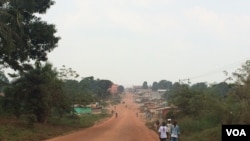For a long time during the Ebola outbreak, Liberians were on their own. Reconstructing events from July when the Ebola outbreak started in the city and how people managed to cope with the deadly and widely misunderstood disease are incisive and encouraging.
“I remember on one occasion a lady sat in a chair and died and spent like four days there. One Saturday we picked 14 bodies from within this town,” said Tarlee M. Vah, who vividly remembered last summer.
She said it was one of the saddest in her life. Ebola had arrived in Ganta and Vah, and the former teacher who sold cake and donuts on the side, tried to help as a mobilizer. She said the amount of sorrow was too much.
“Everywhere was cry. Everywhere. Everywhere. Because there was nowhere for you to run, to say 'This place is safe.' Everywhere was everybody crying. Dead bodies were all around,” said Vah.
Ganta, a city of 40,000 in northern Nimba County, was without help. Ebola struck at the end of July. The first makeshift treatment unit was not built until two months later. During this time, Ganta was a ghost town, rife with panic and fear.
People ran away to rural villages or quarantined themselves, said Lincoln Y. Paye, a community leader.
“You quarantine yourself to avoid going around other people because you don’t know who has the thing,” said Paye.
It was like a war, said Jamesetta Munah Cooper, who works for the local YMCA. Mobile phones became one of the most important items, easy to control and clean.
To avoid the potentially risky charging station on the street outside, she reduced her consumption and mainly used the phone to call her two boys, who she locked at home when she went to work - often struggling if this was the right thing to do.
“As certain times came, I told myself: There is no need. So I decided what if I leave them here and something happens to them? So I decided locking the door, and they and myself were going to work together,” said Cooper.
On their own, the people of Ganta organized themselves in early August. About a hundred came together, traced cases, and buried people -- without the protective gear recommended by health professionals.
The regional government of Nimba County joined their efforts later. County Inspector Reginald Mehn said officials had not much more than chlorine, a few excavators and their hands to help. He said there were times in August and September when he thought they would lose the fight.
“People will be calling you on the phone: 'There is body here, there is body there, there is body there, there is body there. You need to come. You need to come.' And you don’t even know where to start first,” said Mehn.
Today, dark memories still weigh on the county inspector.
“It was almost like a mass burial at that time. People were not buried in a dignified manner, let me be frank with you, at that time. The forehand loader will just dig the grave and then you put it in the body bag. You got it sprayed all over, and take it there. And then buried them. They are still there. They are still there,” he said.
Locals say Ebola came to Ganta at the end of July when John Wolobah, a street vendor, visited family in Lofa county and came back sick. He went to a clinic, was released. Later that day, a woman named Roseline Tokpah went to the clinic with her sick, pregnant daughter. The daughter used the same bed as John Wolobah. Tokpah stayed next to her.
Wolobah died, as did Tokpah and 14 members of her family.
Roseline Tokpah’s house is in the poor Small Ganta community, surrounded by tall, old mango trees and fields.
Ebola divided Small Ganta along the main road. The side of Roseline Tokpah’s house was the Ebola zone. The other side remained Ebola free. People only started crossing back in November.
Ganta eventually received a mobile clinic. It was built by the U.S. military and opened on December 31 - when the Ebola epidemic was just about over. By then, Nimba had been without new cases for two months. Eighty-three people died in Nimba County, most of them in Ganta."




